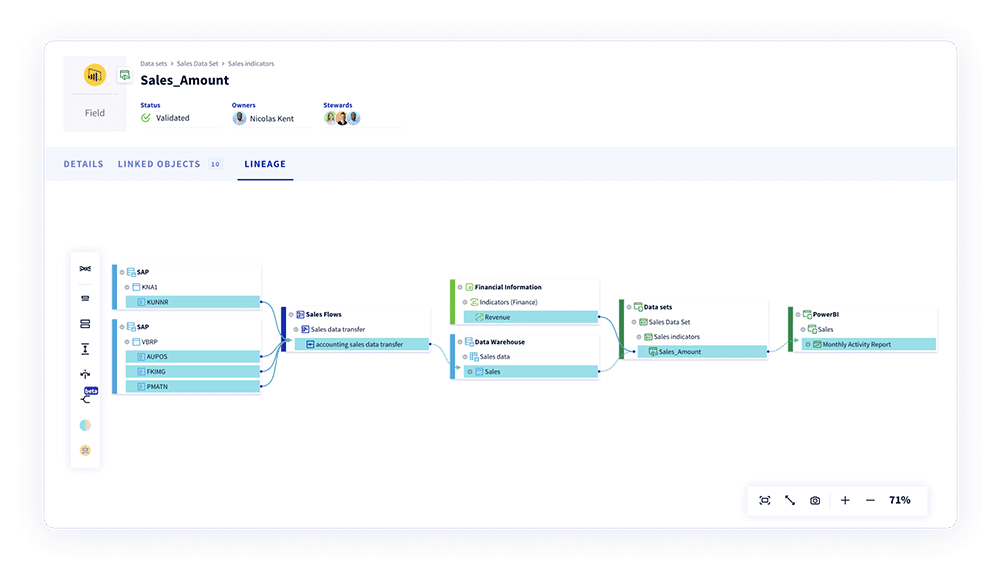Data lineage is essential for organizations relying on complex data ecosystems to drive their decision-making processes. By understanding the intricate journey of data – from its source to its destination and the transformations that occur along the way – organizations can ensure data accuracy and integrity. This article highlights the top five benefits of implementing organizational data lineage for data professionals.
What is data lineage?
Data lineage is a comprehensive representation of the lifecycle of data within an organization, capturing its origin, movements, transformations, and dependencies throughout the data pipeline. By tracing the data’s journey from source to destination, data lineage offers a detailed understanding of how it is extracted, transformed, loaded, and integrated into various data warehouses, reporting systems, and data lakes. This visibility into the data’s history, context, and relationships ensures that data professionals can analyze, monitor, and optimize data flow to ensure improved accuracy and efficiency.
Top 5 benefits of data lineage for businesses
- Improved data quality:
Data quality is critical for making informed decisions, and data lineage plays a pivotal role in enhancing it. By providing a clear understanding of the data’s origin, transformations, and dependencies, data lineage provides root cause analysis that helps organizations efficiently identify and address data quality issues. - Reduced technical debt:
Incorporating data lineage into a robust data governance framework can significantly reduce technical debt by streamlining data storage, access, consolidation, and integration. Data lineage can also help enable organizations to maintain a consistent and efficient data infrastructure while reducing redundancies and repetitions. - Enhanced impact analysis:
Data lineage allows organizations to swiftly identify data assets affected by modifications, enabling prompt impact analysis. It is crucial to work quickly to identify, locate, and prevent adverse down-stream effects, and data lineage helps mitigate inadvertent disruptions to data assets by providing a clear view of data dependencies and interrelationships. - Increased trust in data products:
Data lineage fosters trust in data products by offering insight into underlying data processes and transformations. When users have confidence in the systems, processes, and data they work with, they are more likely to engage with and utilize these resources effectively. As such, data lineage empowers users by promoting transparency and trust in data-driven decision-making. - Regulatory compliance:
Data lineage supports regulatory reporting, which is tailored to specific use cases and industry requirements. It is essential to comply with stringent data privacy regulations and ensure that organizations adhere to the necessary guidelines. By providing a detailed view of data’s journey and transformations, data lineage enables organizations to demonstrate their compliance with various local, national, and worldwide data regulatory standards.
Why data lineage is important
In addition to the benefits listed above, there are several reasons why data lineage tracking is crucial for organizations with complex data ecosystems.
Improved collaboration & communication: Data lineage fosters collaboration among various project stakeholders, including data scientists, analysts, engineers, and business users by providing a shared understanding of the data landscape. This common view of the data’s journey and dependencies facilitates effective communication, leading to more informed and efficient decision-making across the organization.
Facilitates data discovery: Data lineage helps organizations discover and catalog their data assets more effectively. By tracing the data’s journey, data professionals can identify relevant data sources and attributes, streamlining data discovery and improving data accessibility for various business processes.
Change management: Data lineage is essential for managing changes within the data ecosystem, such as system upgrades, data migrations, and schema modifications. By providing a clear view of data dependencies, data lineage enables organizations to plan and execute changes more effectively, minimizing the risk of unforeseen consequences of down-stream systems and processes.
Data security & privacy: Data lineage contributes to improved data security and privacy by offering insight into the ways sensitive data is processed, stored, and accessed throughout the organization. This information allows organizations to identify potential vulnerabilities and implement appropriate safeguards to protect sensitive data, ensuring compliance with data protection regulations.
Provenance & accountability: By maintaining a clear audit trail of data movement and transformations, organizations can trace data back to its original source, ensuring the authenticity of the data and providing a clear view of the parties responsible for any changes or modifications.
In conclusion, implementing data lineage brings numerous benefits to organizations with complex data ecosystems. It improves data quality, reduces technical debt, enhances impact analysis, fosters trust in data products, and ensures regulatory compliance. By leveraging data lineage, advanced data practitioners can optimize their data infrastructure and drive more accurate, informed decision-making processes.
The DataGalaxy difference

- Follow the complete path of your data.
- Comprehensive overviews in the blink of an eye!
- Automated column-level analysis to prevent risks
—
Learn even more about using your data as an asset to achieve higher levels of data governance and data quality with DataGalaxy! Book a demo today to get started on your organization’s journey to complete data lifecycle management and begin your first use case in 90 days or less.





